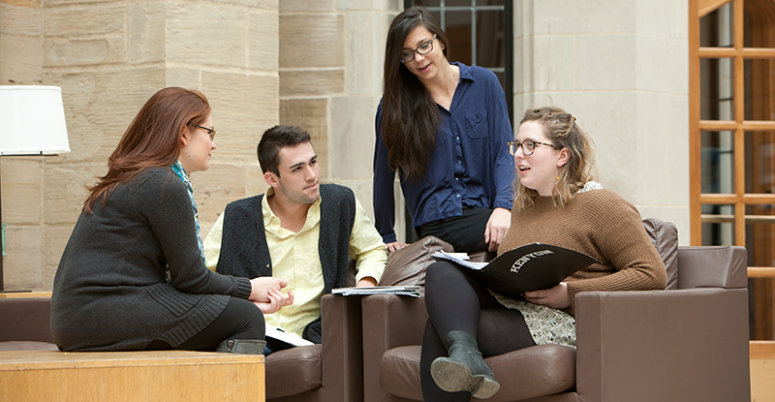Contemporaries and Counselors

From Kenyon News - April 14, 2014
Kenyon offers an array of counseling services to students to help with everything from friendship conflicts to depression. But that came as something of a surprise to Tim Jurney ’15 when he was a first-year student because he watched others around him struggle without knowing where to turn.
“There was just a disconnect,” said the Spanish area studies major from Minneapolis. So with the help of Patrick Gilligan, director of counseling services, and fellow students Charlotte Reed ’15, Gina Rickert ’14 and Olivia Grabar Sage ’15, he started Peer Counselors, a peer-to-peer organization meant to help students wrestling with any number of concerns navigate the services available to them.
Every first-year student is assigned a peer counselor, or PC, to help him or her build a kind of social-support system. PCs also run a 24-hour crisis hotline, organize several small group discussions to address mental health concerns and sponsor events to help reduce the stigma of seeking help.
The group of 30 to 40 counselors undergoes three days of training to equip them with the tools needed to help their peers, including phone numbers for the various professional services available on campus. The goal is for PCs to be the first line of support to any student who is struggling.
“Sometimes if you’re depressed, you don’t need to go to a professional. You just need to talk to a friend or a peer about it,” said Rickert, a neuroscience major from Downers Grove, Ill..
And that’s one thing that sets Kenyon’s Peer Counseling group apart from other colleges and universities, said Gilligan. “Colleges are faced with a trajectory of need that seems overwhelming,” he said. Instead of increasing the staff at the counseling center, Gilligan says empowering the students makes sense. “Students want to help and are in the best position to help.”
The College’s approach caught the eye of event organizers at the Depression on College Campuses Conference held at the University of Michigan in March. When Jurney and the other PCs submitted an application to present a poster on peer counseling, they were asked to conduct a three-hour presentation on the success of their model instead.
Jurney said he was excited to share what has worked in the organization’s two years on campus. “I think peer counseling is a really important tool for counseling programs in the future because people are realizing you can’t just approach anything from one side.” A well-rounded program, he said, can’t come just from administrators or students or medications or talk therapy. “We have to have a community that attacks it from all facets. I think this is definitely something other colleges should be looking at more than they are.”
From a more personal point of view, the PCs can see the positive effects of their work here on campus. “If I can answer the phone at 4 in the morning and talk someone out of a panic attack, we’re doing something good,” said Reed, an American studies major from Los Angeles. “It’s terrible that anyone is feeling that way at all. But the fact that they now know that they have an outlet or that they have some kind of safety net, it’s so heartening.”